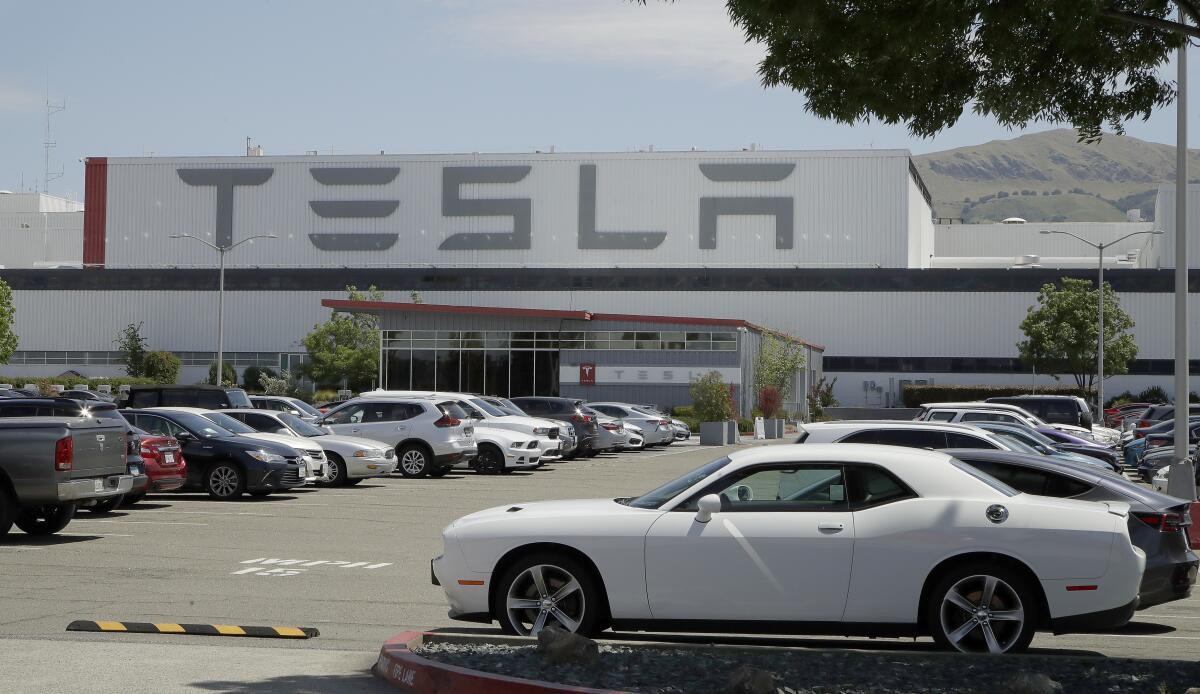Tesla touches trillion-dollar market cap milestone with Hertz deal

Tesla Inc. joined an elite group of companies with market values of at least $1 trillion on Monday, a key milestone for the carmaker, whose shares have been on a tear amid a global shift to electric vehicles.
The maker of the Model 3 sedan — the top-selling electric car worldwide — is now the second-fastest company ever to reach this mark, taking just over 11 years since its public debut in June 2010. Facebook Inc. did it faster, although its market capitalization is now below $1 trillion as the stock has sold off over the last two months. Other U.S.-listed members of the trillion-dollar club include Apple Inc., Microsoft Corp., Alphabet Inc. and Amazon.com Inc.
Tesla’s stock closed up 13%, its biggest one-day move since March 9, at a fresh record of $1,024.86. This took its market capitalization comfortably above $1 trillion, based on about a billion shares outstanding as of Oct. 21.
“Tesla shares have a tendency to be quite volatile and driven by a wide range of market forces that are difficult to comprehend,” Morgan Stanley analyst Adam Jonas wrote in a note. Jonas said he believes Tesla shares are worth $1,200, but he doesn’t have any expectation that the shares will rise to such a level in the near term.
While regulators investigate a spate of Teslas steering themselves into parked vehicles, Tesla owners have been reporting faulty collision-avoidance systems.
Tesla’s addition to the coterie of mega-cap technology names comes as the automotive industry is on the cusp of a massive transformation, with electric vehicles expected to take the place of gas-driven cars globally. The company and its charismatic and often controversial chief executive, Elon Musk, are seen as one of the main driving forces behind this shift.
Musk’s wealth has skyrocketed alongside the latest climb in the company’s stock price. The billionaire co-founder is now the richest man in the world, with a net worth of about $281 billion. Musk is also the biggest shareholder of Tesla, with a nearly 17% stake, according to Bloomberg data.
The company’s shares have been on a streak over the last five months, climbing more than 80% since mid-May. However, the rally got a big boost this month amid a flurry of encouraging headlines: strong third-quarter earnings and deliveries, a big order from car-rental giant Hertz Global Holdings Inc., and a report that the company’s Model 3 was the top-selling vehicle in Europe last month.
“Tesla is the leader in EV manufacturing, batteries and autonomy,” analyst Jonas wrote Monday. “Tesla also has a suite of enabling technologies and other businesses that would allow the company to be an auto and energy champion in the long run.”
The push toward electrifying all modes of transportation — especially cars, trucks, buses and vans — has rapidly intensified this year, with governments pledging to find solutions for the climate change crisis. Countries across the world have announced policies to lower carbon emissions and incentivize corporations to move toward greener technologies. The entire electric-vehicle ecosystem — including carmakers, battery developers and charging-network operators — has been climbing as a result.
“The outlook for EV adoption is getting much brighter, due to a combination of more policy support, further improvements in battery density and cost, more charging infrastructure being built, and rising commitments from automakers,” Bloomberg New Energy Finance noted in a September report. BNEF estimated that passenger electric-vehicle sales will increase sharply in the next few years, reaching 14 million in 2025 compared with 3.1 million in 2020.
But some say those bright and shiny growth numbers still do not fully justify Tesla’s mammoth size. It has a market capitalization that’s significantly bigger than all of the top car companies combined, but Tesla still manufactures only a fraction of the number of cars that some of these companies, such as General Motors Co., produce.
“We acknowledge Tesla is executing impeccably, but this does not alter our view Tesla is egregiously overvalued,” Roth Capital Partners analyst Craig Irwin wrote in a note Oct. 21, saying that the company’s current valuation appears to rest on the “specious assumption that the hundreds of EVs slated for launch by 2025 will all be flops.”
Competition is indeed building up. After being on the sidelines for years, with mostly hybrid or just a few electric cars in their lineup, almost all major legacy auto companies this year have announced aggressive plans for making electric vehicles and developing the required ecosystem that includes batteries and charging-station networks.
Bullish investors and analysts, on the other hand, say Tesla should not be compared to its auto peers at all. It is more like a technology company, they argue, and is correctly valued accordingly.
Tesla shares currently trade at 178 times their estimated 2021 earnings, compared with 43 times for the NYSE+ FANG Index, whose other nine members include Nvidia Corp., Alphabet, Apple, Twitter Inc., Facebook, Amazon.com, Netflix Inc., Alibaba Group Holding Ltd. and Baidu Inc.
More to Read
Inside the business of entertainment
The Wide Shot brings you news, analysis and insights on everything from streaming wars to production — and what it all means for the future.
You may occasionally receive promotional content from the Los Angeles Times.











